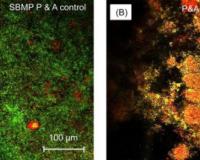Overview
A major clinical problem associated with dental restorations is secondary cary formation and tooth restoration fractures. To address this issue, a new dental resin developed at the University of Maryland, Baltimore, was created that possesses superior mechanical strength and antimicrobial properties. The formulation consists of inorganic nanoparticles and resins that impede the formation of caries by neutralizing cariogenic pH values, inhibiting the growth of acidogenic, tooth-demineralizing bacteria such as S. mutans and remineralizing the tooth enamel by enhancing calcium and phosphate release in response to increased acidity.
The Invention is dental formulation consisting of an antimicrobial resin composition and amorphous calcium phosphate (NACP) The dental formulation of the invention displays antimicrobial properties, remineralization efficacy and the ability to neutralize cariogenic pH. A study using dental plaque microcosm biofilm models, with human saliva, confirmed the reduction of bacterial acids by 20x with the anti-bacterial composites compared to the control. In addition, the antibacterial composites successfully reduced bacterial growth and invasion into the tooth margins (Fig. 1). The antibacterial composites are clinically significant due to their potential to prevent secondary caries and ability to be incorporated into dental adhesives and restoratives for use in fixed orthodontic therapy.
Photos
Applications
An estimated 200 million dental restorations are placed each year in the United States, amounting to an annual cost of several billion dollars. Of the many dental restorations performed, caries at the restoration margins remain the primary reason for failure, and half of completed restorations need replacement within ten years. Dental caries remains one of the most prevalent and preventable chronic diseases in the United States. Worldwide dental caries exists in 60-90% of children and almost 100% of adults.
Advantages
· Prevents secondary caries formation in resin-based restoratives.
· Prevents development of demineralized areas around orthodontic brackets
· Composites have improved antibacterial, mechanical properties and durability compared to existing composites.
Stage of Development
The anti-bacterial monomers, antibacterial resins and dental composites have been optimized and analyzed for antibacterial activity, mechanical strength, durability and biocompatibility.
(Updated 9/2017) - MEW
Licensing Potential
UMB seeks partners for nonexclusive licensing, clinical development, and/or sponsored research to advance this technology into the healthcare field.
Contact Info
Office of Technology Transfer
620 W Lexington St., 4th Floor
Baltimore, MD 21201
Email: [email protected]
Phone: (410) 706-2380
